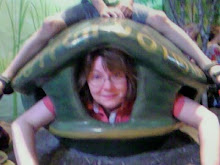Evenings in the late fall in western Kazakhstan last a very long time. We ate a simple supper, cleaned the small apartment, and finished unpacking. And then it was 7 PM.
The porch that jutted from the bedroom was not big enough to drag a chair out onto, but you could lean on the base of the bay window and look across the rutted and weedy common area to watch the lights of the other apartments come on one by one.
Terry fiddled with the two televisions. There was a VCR but no tapes. The set in the bedroom was capable of pulling in channel after channel of static, plus a couple in Kazakh and Russian and not English.
 The apartment was ungodly hot. We opened every window that opened -- meaning a kitchen window, the porch and two windows in the living room -- and prayed for cross-ventilation. The apartments and many other buildings is Uralsk are centrally heated with steam heat. By "centrally" I mean that the whole city is heated by huge silver pipes. I suspect that the place looks like a circuit board from space. Inna explained that they turn on the heat on a certain date in the fall and turn it off in the spring. The bureaucrat who flips the switch pays no attention to the weather. The Kazakhs have a long association with Soviet-style government; if their apartments are ninety degrees in November, they open the window and carry fans. That's just how it is.
The apartment was ungodly hot. We opened every window that opened -- meaning a kitchen window, the porch and two windows in the living room -- and prayed for cross-ventilation. The apartments and many other buildings is Uralsk are centrally heated with steam heat. By "centrally" I mean that the whole city is heated by huge silver pipes. I suspect that the place looks like a circuit board from space. Inna explained that they turn on the heat on a certain date in the fall and turn it off in the spring. The bureaucrat who flips the switch pays no attention to the weather. The Kazakhs have a long association with Soviet-style government; if their apartments are ninety degrees in November, they open the window and carry fans. That's just how it is.We needed to consider officially selecting two of the children whom we had met. Natalya, the gentle and stylish dynamo, had been careful to tell us that we wouldn't be pushed into making a decision and at the same time reminding us that any delay would throw the schedule right out the window by extending our time into the tumult of the presidential election, the winter holidays where government offices are closed for several weeks, and maybe a change in the laws. But, hey, take your time. No pressure.
We talked into the long evening. The Nurlan whom we finally met was mostly as we had imagined him. He had a clean bill of health, both from our doctor and from the Kazakh doctor. He was obviously bright and seemed to have a curiosity about the world that had not been dulled by the institution. We liked him and could easily see him becoming part of our family.
The question of the second child weighed heavily. Anastasiya had been thrilling to hold, but the shake had frightened us. What if she had some horrible condition? She didn't seem to have a mental disability beyond the delay that is the product of institutionalizing children, but what did we know? We were told that she had been born three months prematurely and had only weighed a few pounds.
This information, if true, conjured up concerns of heart defects and cerebral palsy. On the other hand, medical records from post-Soviet countries are jarring to outsiders since birth itself is recorded as a trauma to the brain. Children placed for adoption have especially scary-sounding medical records. Some people in the adoption community chalk this up to the psychological need on the part of the society to explain why these children are given a lesser status. On the flip side, medical defects are played up in court as a justification to permit a foreign adoption, allowing a child to get medical treatment not available in Kazakhstan. Just another one of those aberrations of the truth that exists in international adoptions because it works and doesn't really hurt anyone.
We liked Anastasiya but were cautious. We felt sorry for and guilty about poor little Irat who so badly wanted to be wanted. We were still jet lagged and not ready to make a decision, schedule or not. Sorry, Natalya.
We decided to tell the agency that we wanted to see more children and particularly to visit Uralsk's other infant and toddler orphanage, Baby House 2.




No comments:
Post a Comment